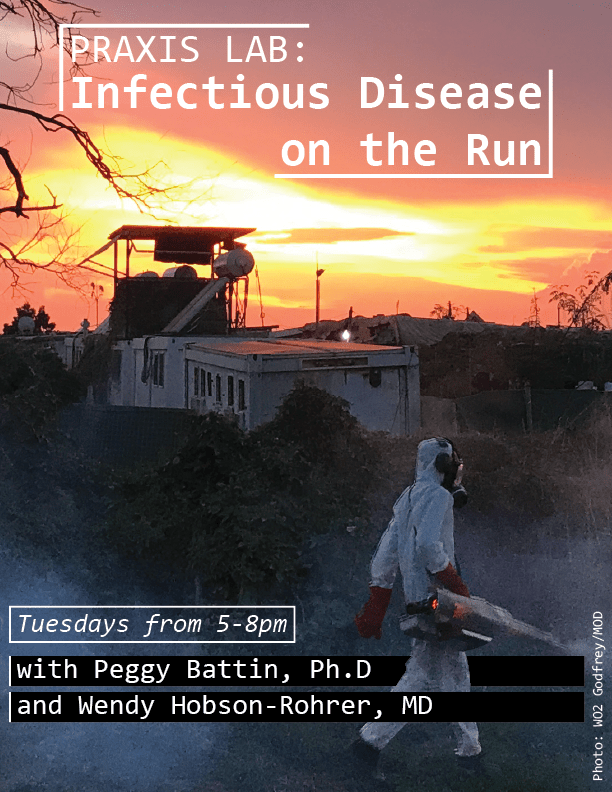
 Infectious Disease on the Run is being offered as a Praxis Lab for the 2021-22 academic year. It will be offered Tues. 5-8pm and will be offered by Peggy Battin, Ph.D, and Wendy Hobson-Rohrer, MD.
Infectious Disease on the Run is being offered as a Praxis Lab for the 2021-22 academic year. It will be offered Tues. 5-8pm and will be offered by Peggy Battin, Ph.D, and Wendy Hobson-Rohrer, MD.
This course focuses on pandemics: past, present, future. Beginning with a close examination of the Black Plague that engulfed Europe during the Middle Ages, smallpox as it spread through Europe and decimated the indigenous populations of the Americas, and syphilis, still endemic, associated with situations of racially biased research and other ethical wrongs, this course focuses on the science of pandemics and the vectors of spread, the social and ethical issues of measures employed in the past and in the present to try to control spread, and how to conceive of prevention in the future.
Why is the course titled “Infectious Disease on the Run”? When we were developing this course, during the earlier days of the Covid-19 coronavirus pandemic, there wasn’t much way to tell whether it’d be the disease that would be on the run by the time the course started, or whether it’d be we humans who’d be on the run, more threatened than before. (That still isn’t clear, of course, whatever we may think about the present moment.)
This course will use case problems, lectures, readings from the medical, public health, bioethics, and other kinds of literature, and a wide variety of visiting and zoom-visiting speakers from around the world to explore these compelling issues. It will provide basic coverage of relevant ethical theory.
Assignments will include short papers, interactive discussion sessions concerning specific case puzzles, and readings assigned both by the faculty and by visiting speakers. For students in Philosophy 5520 and 6520, a term project is to be presented to the class at the end of the semester; for students in Honors 3700, the Praxis Lab, a joint term project is to be framed in general by the end of Fall semester, presented for discussion to the class as a whole, and is to be carried out during Spring 2022.
The course will meet in-person or virtually as circumstances dictate.
Faculty
 Margaret P. Battin, PhD – Distinguished Professor, Philosophy and Adjunct Professor, Internal Medicine and Division of Medical Ethics and Humanities
Margaret P. Battin, PhD – Distinguished Professor, Philosophy and Adjunct Professor, Internal Medicine and Division of Medical Ethics and Humanities
If you want to address me formally, it’s Margaret Pabst Battin, M.F.A., PhD., Distinguished Professor of Philosophy and Adjunct Professor of Internal Medicine, Division of Medical Ethics and Humanities, at the University of Utah, or, for short, Peggy. You could make it more ostentatious by pointing out that I’ve authored, co-authored, edited, or co-edited at least twenty books (I think I’ve lost count), including works on philosophical issues in suicide, case-puzzles in aesthetics, ethical issues in organized religion, and various topics in bioethics. You could embellish it by observing that I’ve published two collections of essays on end-of-life issues, The Least Worst Death and Ending Life, and have been the lead for two multi-authored projects, Drugs and Justice and The Patient as Victim and Vector: Ethics and Infectious Disease. In 1997, I won the University of Utah’s Distinguished Research award, and in 2000, received the Rosenblatt Prize, the University’s most prestigious award. You can find a TEDMED talk I did in 2014 by googling the web. This is all very flattering, but what’s important to me is not just what I’ve done in the past, but what I’m working on now: a comprehensive historical sourcebook on ethical issues in suicide, being published by Oxford, a multi-co-authored volume of case-puzzles about issues in disability (also Oxford), and a book on large-scale reproductive problems of the globe, including population growth and decline, teen pregnancy, abortion, and male roles in contraception, along with new ideas like urban design or thought-experiments or even how to redesign the ICU. Of course, there’s hardly ever enough time, but big new make-the-world-a better-place ideas, the very kind of thing a Praxis Lab is intended to generate, seem to me what it’s all about.

Wendy L. Hobson-Rohrer, MD, MSPH, FAAP
Wendy L. Hobson-Rohrer, MD, MSPH has focused her career as a general pediatrician on education and caring for the underserved. Dr. Hobson-Rohrer graduated from Cornell University with a B.A. in Spanish and Latin American Studies and with Distinction in All Subjects. She then completed her M.D. degree at Cornell University Medical College. She moved to Utah for her pediatric internship and residency at the University of Utah. After working for a few years in the National Public Health Services Corp at the Community Health Centers Inc., Dr. Hobson-Rohrer pursed a fellowship in education and completed her M.S.P.H degree at the University of Utah.
Dr. Hobson-Rohrer is the Executive Medical Director of the South Main Clinic whose mission is to provide high quality, comprehensive, and cost-effective care to underserved families in our community and care to specialized populations that lack access to appropriate services while sharing community resources.
Dr. Hobson-Rohrer cares for a large number of children and youth with special health care needs, including those with cerebral palsy, Down syndrome, cardiac diseases, and other genetic disorders. She has focused her clinical research and advocacy efforts on caring for these children and their families. With a five-year Healthy Tomorrows Partnership for Children grant, she developed Niños Especiales/Familias Fuertes (Special Children/Strong Families), a support group system for families with Latino children with special health care needs.
Dr. Hobson-Rohrer is the Chair of the CATCH (Community Access to Child Health) committee of the American Academy of Pediatrics. She served as the Co-Chair of the APA Serving the Underserved Special Interest Group for seven years.
Please select a valid form
